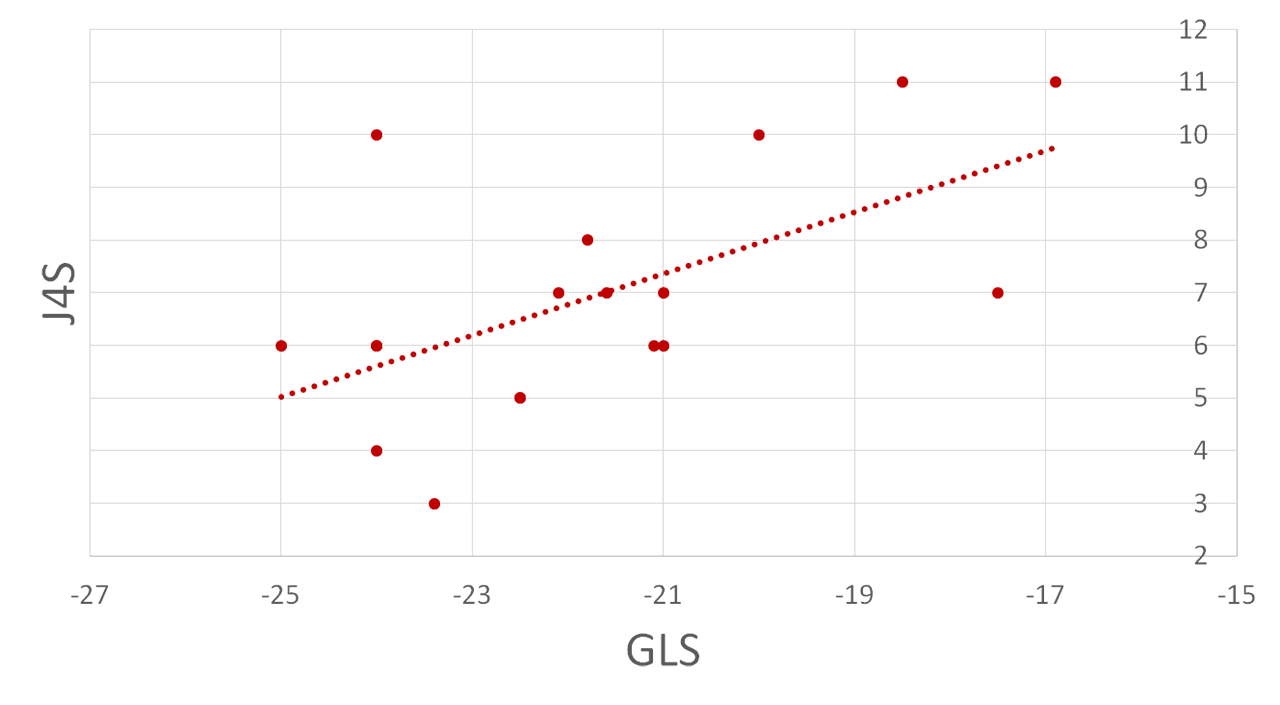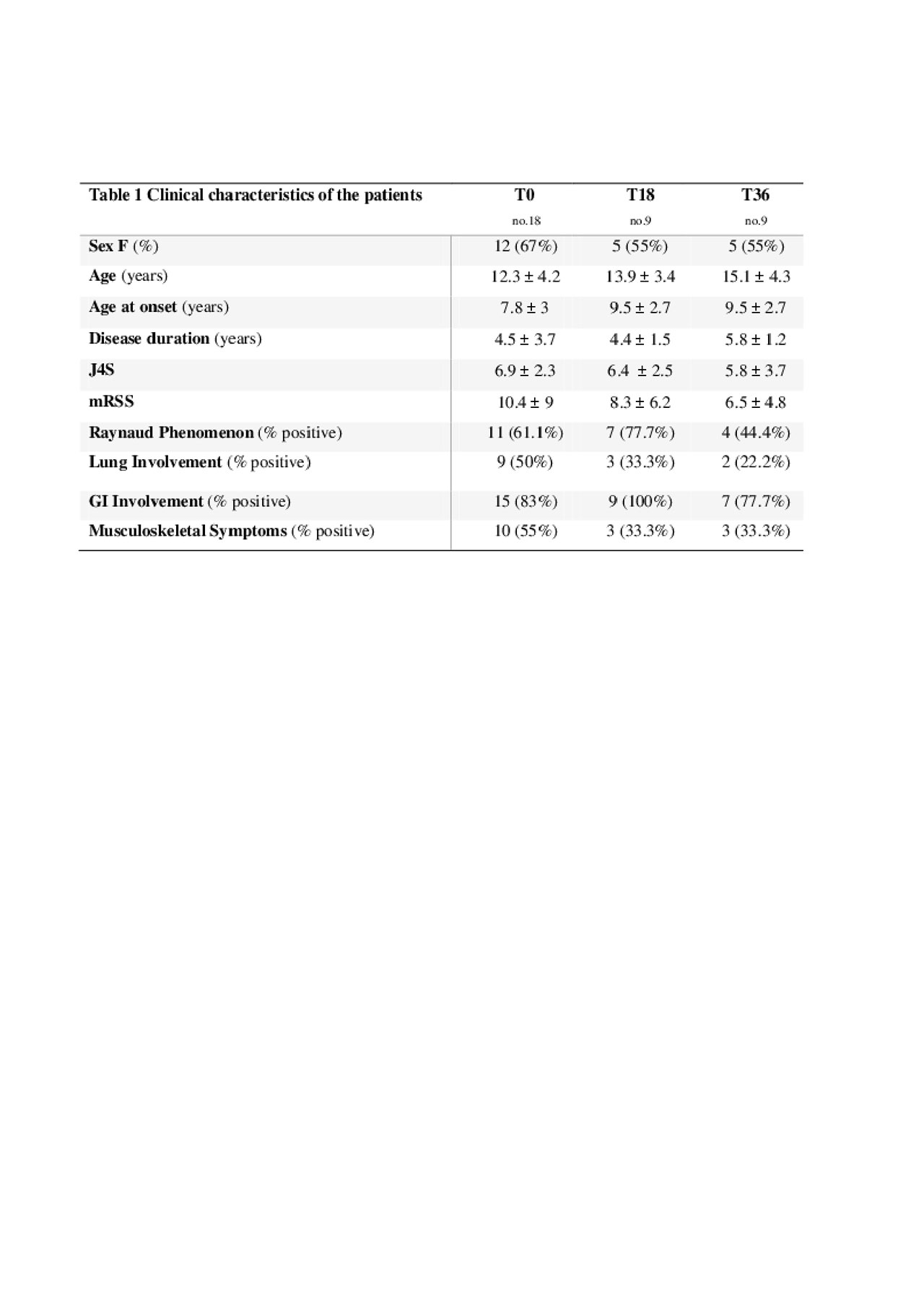Session Information
Date: Sunday, November 10, 2019
Title: Pediatric Rheumatology – ePoster I: Basic Science, Biomarkers, & Sclerodermic Fever
Session Type: Poster Session (Sunday)
Session Time: 9:00AM-11:00AM
Background/Purpose: Juvenile Systemic Sclerosis (JSSc) is a rare connective tissue disease in which cardiac involvement is burdened by high morbidity and mortality. The traditional cardiac imaging techniques seem to be partially appropriate to assess the subclinical course of the disease. In adult-onset SSc, the Speckle Tracking Echocardiography (STE), was shown to be able to identify regional ventricular dysfunctions also in early stages of [1,2]. Aim of our study was to assess the role of STE of the right and left ventricle in order to identify early ventricular dysfunctions in JSSc.
Methods: Consecutive patients with JSSc [3], followed at our Pediatric Rheumatology Center, were periodically evaluated by the cardiology team. For each patient, information on demographic and clinical data, autoantibody profile and treatment were collected. Cardiac investigations, performed at least three times, at baseline (T0), 18 months (T18) and 36 months (T36) included: electrocardiography, conventional echocardiography, STE with assessment of left ventricular global longitudinal strain (GLS) (n.v. < -19%) and right ventricular longitudinal strain (RVLS) (n.v. < -25 %). The course of cardiac involvement during the follow-up was correlated with the overall disease severity, measured by the Juvenile Systemic Sclerosis Severity Score (J4S)[4]. Results: 18 JSSc patients, 12 (67%) females, entered the study (Table 1). ANA were positive in 17 patients (94%), 6 (33%) were anti Scl-70+. At T0, EKG was abnormal in 3 patients, EF was reduced in one survivor to cardiopulmonary arrest (EF=53.8%), the GLS was abnormal in 3 patients, only one with concomitant reduced EF and clinical history of cardiac involvement. A significant correlation between GLS and J4S at T0 was found (r=0.595; p=0.012) (Figure 1). The RVLS resulted abnormal in 5 patients with significant correlation with GLS (r=0.693; p=0.002). At T18, EF remained relatively stable while at T36 it decreased in 7/9 patients, with a mean value of 62.2% (p=0.09). GLS also worsened (from -21.6% to -18.2%; p=0.01). As for treatment, at baseline, none of the patients with pathological GLS was assuming calcium channel blockers (CCB), while all of those taking CCB during follow up had normal GLS. GLS at baseline showed a significant correlation with the disease severity, measured by J4S (p=0.012). The same was observed for the RVLS (p=0.02).
Conclusion: STE is more sensitive than standard echo to evaluate the cardiac involvement in JSSc. Over time, we observed a gradual worsening of GLS, sign of a progressive left ventricular dysfunction, that was not identified by EF. It is possible that the coronary microvascular damage compromises the subendocardial fibers function which are more sensitive to ischemia and whose contractility is well assessed by GLS [5].
References
- Spethmann S et al. Eur. Heart J Cardiovascular Imaging 2012; 13:863–870.
- Dedeoglu R et al. Pediatric Cardiol 2017; 38:1686–1695.
- Zulian F et al. Arthritis Rheum 2007; 57:203–212.
- La Torre F et al. Arthritis Rheum 2012; 64:4143–4150.
- Geyer H et al. J Am Soc Echocardiog 2010; 23:351– 369.
To cite this abstract in AMA style:
Civieri G, Castaldi B, Martini G, Meneghel A, Milanesi O, Zulian F. Speckle Tracking Echocardiography, a Sensitive Tool to Detect Early Cardiac Dysfunctions in Juvenile Systemic Sclerosis [abstract]. Arthritis Rheumatol. 2019; 71 (suppl 10). https://acrabstracts.org/abstract/speckle-tracking-echocardiography-a-sensitive-tool-to-detect-early-cardiac-dysfunctions-in-juvenile-systemic-sclerosis/. Accessed .« Back to 2019 ACR/ARP Annual Meeting
ACR Meeting Abstracts - https://acrabstracts.org/abstract/speckle-tracking-echocardiography-a-sensitive-tool-to-detect-early-cardiac-dysfunctions-in-juvenile-systemic-sclerosis/


